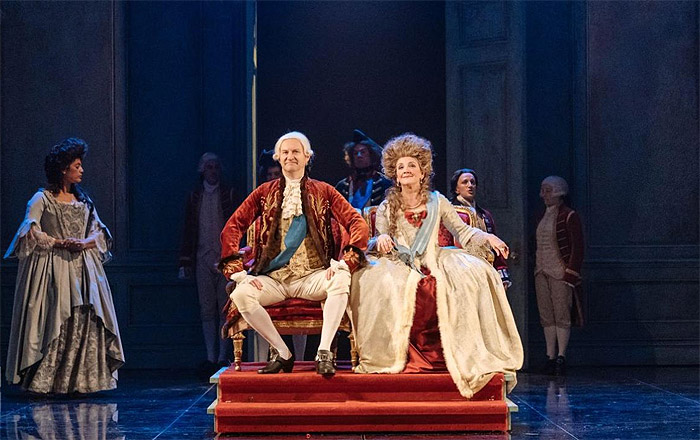Produced by Alan Bennett
11th – 18th June 2020
Free to watch on National Theatre’s YouTube channel
Reviewed by Ashley McGovern
The Madness of George III brings with it visions of Bennetts past. Not the working class hero of Enjoy (1980). Or even the young Anglican vicar of Beyond the Fringe, his first performance. But Bennett as he would have been centuries ago. The play is slight fare about an amusingly tense episode in our history. What it proves, however, is Bennett would have been a terrific writer of royal entertainments. It’s easy to imagine him penning swift, decorative masques and becoming the toast of the Stuart court. (Pieces like The Masque of Beauty: Mother’s Sudocrem Face Peel, perhaps).
This play (TMG3, for short) takes place over a century after masque mania. It’s 1788 and King George III is raving mad. An eccentric king full of guile, bluntness, but not stupidity, descends into a mad spell no one understands. He gains a new genius for insult. He acts the delirious fool and talks non-stop. His libido starts to stray everywhere except in the direction of Queen Charlotte. Opinion varies about what’s going on. Some think it’s an excess of the bilious humours, some call it an “ intellectual malady”; some over-egg the disease and it’s staying power, others think it’s a temporary dizzy spell.
Everyone uses it to their advantage. Both sides of the Commons become obsessed with regime change. The Tories, led by William Pitt the Younger, are loyal servants. They follow the king to the letter and are sad to see his demise. In contrast, The Whigs, led by Charles Fox, are plotting furiously. They want to install the foppish but malleable Prince of Wales, by far George’s least favourite child, as acting regent. Then they can run the country exactly how they want. A dimwitted monarch means free license. TMG3, therefore, follows a course of therapy for both king and country.
Mark Gattis plays a brilliant King George. He’s an imperious figure to start with, so Gattis puts in the lordly, superior groundwork before we get to the twitchy madness. His delivery is perfect. Gattis moves from unchallengeable, smug phrasing at first, to frantic barks during the scenes when the king’s mind has run off to Balmoral.
And there’s plenty of fun with the idea of King as test subject. His life has been a series of political tests, now it’s time for medical trials. At first he is treated by the resident royal doctor, head of the Royal College of Physicians, Dr Baker. If you thought William Gull (the notorious Ripper suspect) holds the title of worst royal doctor, then make room.
Baker, played brilliantly by Stephanie Jacob, is a hilarious incompetant. All he does is check the pulse and boast about his skill. His cronies are no better. As part of the political plotting, many doctors are summoned – with the hope that, playing the numbers game, someone will deem the King unfit for service. His Majesty is subject to stool analysis (plenty of jokes here), horrific bloodletting and blistering, as well as the occasional check of the pulse.
The other star part goes to Dr Willis, played by Adrian Scarborough. He’s the sane one of the bunch. His method is to break the head of state like you would a horse. This doctor-patient relationship is the most important one in the play. Scarborough is just the right
amount of dedication, vanity and begrudging sympathy. He has no airs, but a good deal of honesty and respect. And though I watched it at home, on YouTube, his projection and stage presence seemed fantastic.
A mention must go to the stage craft. The stage is a revolving set of walls. Bennett’s script is made up of short explosive scenes, so the walls have to swivel rapidly to reflect whichever corridor of power the players find themselves in. The walls and doors are palatial but with a faded look like the Statue of Liberty: a grimy green that used to be something else. Maybe this reflects the phlegmatic humour which the King is overburdened with.
TMG3 shows madness at different levels. One is the madness of worship, the bubbling over of suppressed rudeness that comes with a lifetime of default respect and admiration. The other, entirely different, is the madness of opportunism. It is the wiliness of holding onto temporary power i.e. government at all costs, as opposed to the King’s power eternal.
Unfortunately, one gets clear priority over the other. Bennett’s script is weighed heavily in favour of the rich, broiling insanities of the King. Everyone else is left with light humour, and even lighter intrigue. The Prince of Wales is nowhere near believable. He’s a cipher for some decent lines about being a languid, dumb gadabout of the late eighteenth-century. Neither do the political scenes leave a strong impression. The entire tone of the play is that this takeover crisis is merely a constitutional blip, a moment of indecency in a court masque that will all soon be over. The Whig opposition never once convinces they’re hungry for power, so the audience can’t buy it. Hence the portrait of George III is affecting, while the madness of grasping politicians – the other side of madness – is fairly funny but dramatically ineffective.
The play is full of good Shakespearean insult and good Wildean chatter. Perhaps a little more of Bennett’s introspection would have worked.
